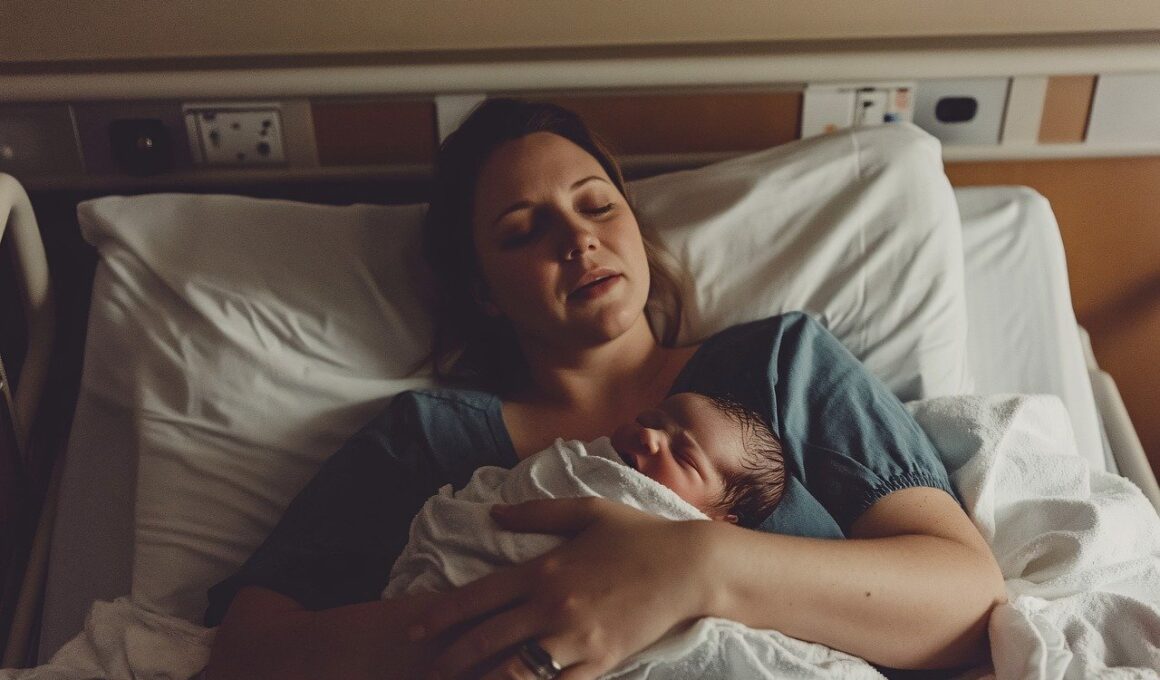Recognizing Signs of Postpartum Exercise Overexertion
After childbirth, your body undergoes significant changes, and understanding what your body can handle during postpartum fitness is crucial. Many new mothers feel the pressure to return to their pre-pregnancy fitness levels quickly, but this can lead to overexertion and injury. Identifying the signs of overexertion is essential for sustainable and healthy recovery. Key indicators include excessive fatigue, persistent soreness, or increased joint pain after workouts. Often, new moms may also notice sleep disturbances that worsen as physical activity increases, indicating a need for a more balanced approach. Another sign is shortness of breath during low-intensity exercises, signaling that your body may be under stress. It’s advisable to start with gentle activities, gradually increasing intensity while paying attention to how your body responds. Consulting healthcare providers or fitness experts specializing in postpartum exercise can be beneficial. They can provide personalized guidance based on your unique situation. Always listen to your body’s signals and honor its need for healing. Promote self-care as an essential component of your fitness journey to ensure both mental and physical well-being during this transformative phase.
Recognizing the difference between normal exercise fatigue and overexertion is important for postpartum recovery. One should not ignore excessive sweating that occurs during basic workouts, which may indicate that you’re pushing too hard. Additionally, postpartum women often experience mood swings and heightened anxiety, which can aggravate with rigorous exercise. If you notice significant changes in your emotional state after workouts, consider moderating your efforts. Stay in tune with your body’s signals to help you adjust your fitness routine effectively. This may include taking more rest days or adopting lower-intensity exercises. Yoga and gentle stretching can help enhance recovery without overstressing your body. Furthermore, hydration plays a vital role in fitness; lack of proper hydration can lead to various issues, including fatigue and muscle cramps, emphasizing the necessity of sipping water consistently before, during, and after workouts. Nutritional intake is equally important—ensuring a balanced diet helps maintain energy levels. If you’re unsure about what your body can handle, seeking guidance from healthcare professionals could provide you with tailored advice, ensuring that your return to fitness promotes wellness rather than exacerbating any postpartum challenges.
Listening to Your Body
Listening to your body is crucial in identifying signs of overexertion. When engaging in postpartum fitness, awareness of physical sensations should be heightened. For instance, you should be cautious if you feel dizzy or light-headed after exercising. These may be signs of overexertion, indicating that your body isn’t ready for high levels of intensity. Moreover, having a quicker-than-normal heart rate during low-impact activities can also signal that you’re pushing beyond your limitations. It’s essential to familiarize yourself with your baseline physical condition before embarking on a more challenging fitness path. Another common indicator is a decline in your motivation and enjoyment of exercise. If workouts start feeling like a chore rather than a fun and uplifting experience, it might be a sign that your body is overworked. Acknowledging how you feel emotionally can help inform your participation in various activities. Connecting with other new mothers or joining support groups can provide morale support and help stay attuned to your exercise practices. Encouragement from peers reminds you that it’s okay to take breaks when needed and prioritize your overall well-being.
In developing your postpartum fitness journey, focus on incremental progress. Setting realistic goals goes hand in hand with listening to your body during this sensitive time. Avoid comparing your fitness journey to others; instead, track your personal progress. Keep a journal to record workouts, feelings, and any signs of overexertion you may experience. This can help you visualize what works while allowing you to identify patterns more easily. Gradually building up strength through workouts such as pelvic exercises, gentle walking, and postnatal yoga can be beneficial. These routines allow for low-impact strengthening without causing undue strain. Additionally, consider scheduling your workouts at times of the day when you feel most energized. Morning sessions might suit some, while others may prefer evenings. This can enhance your overall enjoyment of exercise while supporting a steadier routine. Remember, the postnatal period isn’t just about physical recovery; it’s also about mental resilience. Prioritizing your emotional health can lead to a more fulfilling experience in managing your fitness and adapting to your new role as a mother.
Setting Realistic Goals
Fitness after childbirth is a journey that requires patience and realistic goal-setting. It’s vital to acknowledge that every woman’s recovery process is unique while setting your exercise targets. Establish small milestones, and celebrate your achievements, no matter how minor they may seem. Remember, moving forward gradually is more effective than rushing your workout intensity. For many women, the focus initially should be on rebuilding core strength and pelvic stability rather than pursuing high-energy activities. It would be best if you gradually incorporated cardiovascular exercise and resistance training as you progress. Moreover, finding enjoyable activities you look forward to can make sticking to your postpartum fitness goals more manageable. Group classes specifically designed for new mothers are a great option, offering social interaction alongside physical activity. This not only allows for accountability but also provides motivation from other women in similar situations. Emphasize creating a supportive environment around your fitness goals, including friends or family members who can join you. Above all, be kind to yourself; remember that each step, no matter how small, is progress in your postpartum fitness journey.
Reevaluating your exercise routine involves regular check-ins with yourself concerning your overall well-being. This practice can help ensure that you are not overextending yourself. If you notice signs of exhaustion or stress, don’t hesitate to adjust your regular workout schedule. This assessment means it’s essential to allow flexibility in your fitness plan to suit your evolving postpartum body. Scheduling lower-intensity activities, such as leisurely walks with your baby or light stretching, can help without pushing your limits. Additionally, incorporating recovery strategies such as passive rehabilitation can also offer benefits during challenging days. Listening to your body should remain a priority while integrating these strategies into your routine. Consider the importance of rest in your overall health as a cornerstone of recovery. Some mothers may feel pressure to adhere to a strict regimen, but flexibility will ensure sustainability and motivation. Being proactive about your exercise regimen, such as knowing when to reduce intensity or volume, encourages positive experiences. Lastly, keep in mind that the postpartum journey of fitness is as much about mental strength as it is about physical capabilities.
Conclusion: Embracing Your Fitness Journey
Embracing and understanding your postpartum fitness journey requires self-compassion and awareness of your body’s signals. Recognizing signs of exercise overexertion plays a pivotal role in ensuring a safe and rewarding return to fitness after childbirth. It’s essential to remember that every postpartum experience is unique and that personal recovery timelines vary. Focus on balancing fitness with adequate rest, hydration, and nutrition while also nurturing your emotional health. Engaging in low-impact exercises and appreciating the benefits of gentle movements can help you reconnect with your body and diminish feelings of overwhelm. Connecting with fitness experts specializing in postpartum care can provide valuable insights tailored to your needs. Surrounding yourself with supportive communities, whether in person or online, helps create camaraderie during shared challenges. Each stage of recovery contributes to your overall well-being, both physically and mentally. Therefore, as you navigate through challenges, it’s crucial to stay connected with your progress, celebrate small victories, and practice grace towards yourself. Keep in mind that healing is personal; finding joy in movement is the ultimate goal within this journey.


